In Christian hamartiology, eternal sin, the unforgivable sin, unpardonable sin, or ultimate sin is the sin which will not be forgiven by God. One eternal or unforgivable sin, also known as the sin unto death, is specified in several passages of the Synoptic Gospels, including Mark 3:28–29, Matthew 12:31–32, and Luke 12:10, as well as other New Testament passages including Hebrews 6:4–6, Hebrews 10:26–31, and 1 John 5:16.

John 20:18 is the eighteenth verse of the twentieth chapter of the Gospel of John in the New Testament. It occurs after Jesus' resurrection and appearance to Mary Magdalene. In the previous verse Jesus has given Mary a message to deliver to his disciples, this verse describes how she delivers it.
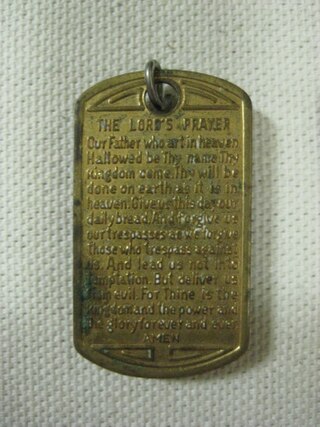
Matthew 6:12 is the twelfth verse of the sixth chapter of the Gospel of Matthew in the New Testament and is part of the Sermon on the Mount. This verse is the fourth one of the Lord's Prayer, one of the best known parts of the entire New Testament. This verse contains the fifth petition to God.
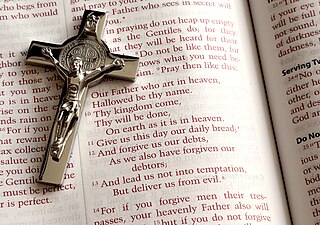
Matthew 6:14–15 are the fourteenth and fifteenth verses of the sixth chapter of the Gospel of Matthew in the New Testament and is part of the Sermon on the Mount. These verses come just after the Lord's Prayer and explain one of the statements in that prayer.

John 20:19 is the nineteenth verse of the twentieth chapter of the Gospel of John in the New Testament. It describes what it says is the first appearance of Jesus to his disciples after Resurrection of Jesus, and in a locked room of a house.
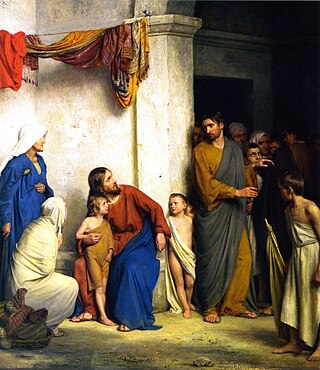
Chapter 18 of the Gospel of Matthew contains the fourth of the five Discourses of Matthew, also called the Discourse on the Church or the ecclesiastical discourse. It compares "the greatest in the Kingdom of Heaven" to a child, and also includes the parables of the lost sheep and the unforgiving servant, the second of which also refers to the Kingdom of Heaven. The general themes of the discourse are the anticipation of a future community of followers, and the role and "spiritual condition" of his apostles in leading it.

John 20:28 is the twenty-eighth verse of the twentieth chapter of the Gospel of John in the New Testament. It is part of a description of what the book says is Jesus' reappearance to the disciples, including Thomas, eight days after his resurrection.

Matthew 9:6 is the sixth verse in the ninth chapter of the Gospel of Matthew in the New Testament.

Matthew 9:7 is the seventh verse in the ninth chapter of the Gospel of Matthew in the New Testament.

Healing the paralytic at Capernaum is one of the miracles of Jesus in the synoptic Gospels. Jesus was living in Capernaum and teaching the people there, and on one occasion the people gathered in such large numbers that there was no room left inside the house where he was teaching, not even outside the door. Some men came carrying a paralyzed man but could not get inside, so they made an opening in the roof above Jesus and then lowered the man down. When Jesus saw how faithful they had been, he said to the paralyzed man, "Son, your sins are forgiven."

John 20:20 is the twentieth verse of the twentieth chapter of the Gospel of John in the New Testament. It contains the reaction the disciples to Jesus' first appearance after his resurrection and Jesus showing his hands and his side.
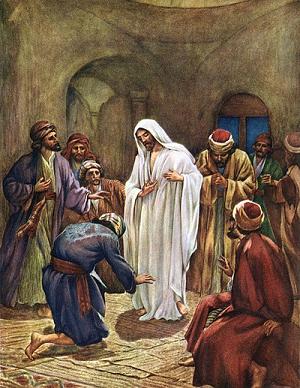
John 20:21 is the twenty-first verse of the twentieth chapter of the Gospel of John in the New Testament. It records Jesus' commission to the disciples during his first appearance after the resurrection.

John 20:22 is the twenty-second verse of the twentieth chapter of the Gospel of John in the New Testament. It records Jesus giving the Spirit to the disciples during his first appearance after the resurrection. Jesus gives Holy Spirit

John 20:24 is the twenty-fourth verse of the twentieth chapter of the Gospel of John in the New Testament. It contains the note that Thomas was absent when Jesus appeared for the first time to the disciples.

John 20:25 is the twenty-fifth verse of the twentieth chapter of the Gospel of John in the New Testament. It contains the reaction of Thomas after the other disciples told him about Jesus' appearance.

John 20:26 is the twenty-sixth verse of the twentieth chapter of the Gospel of John in the New Testament. It records Jesus' reappearance to the disciples, including Thomas, eight days after his resurrection.
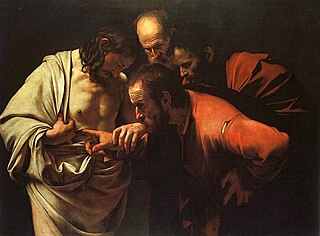
John 20:27 is the twenty-seventh verse of the twentieth chapter of the Gospel of John in the New Testament. It records Jesus' reappearance to the disciples, including Thomas, eight days after his resurrection.

John 20:29 is the twenty-ninth verse of the twentieth chapter of the Gospel of John in the New Testament. It records Jesus' reappearance to the disciples, including Thomas, eight days after his resurrection.

John 20:30 is the thirtieth verse of the twentieth chapter of the Gospel of John in the New Testament. It contains the statement of purpose for the whole gospel.

John 20:31 is the thirty-first verse of the twentieth chapter of the Gospel of John in the New Testament. It contains the statement of purpose for the whole gospel.

















